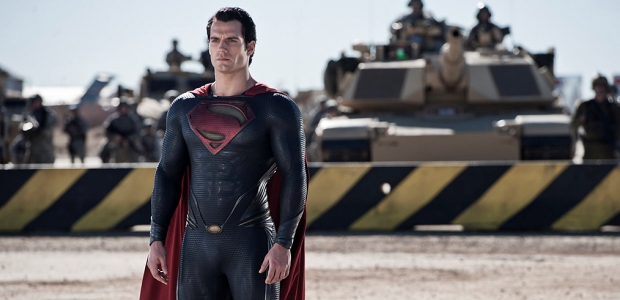There is a climactic scene just before the end of Kill Bill: Vol.2. In poetic fashion, the main villain, Bill, narrates why Superman is unlike any other superhero: Every superhero wears a costume or a powered suit that enables them to become invincible. On the other hand, Superman disguises himself as Clark Kent. Clark Kent is the costume. This costume blends in with human frailties of doubt, despair, weakness and cowardice. At the time, writer and director Quentin Tarantino had no way of knowing what influence that philosophy would have on the mythology behind the most iconic superhero in pop culture. If Tarantino’s philosophy is merely an iceberg of thought, the ethos in Man of Steel is an entire glacier by comparison.
Based on a story by David S. Goyer and Christopher Nolan, scripters behind The Dark Knight trilogy, the mythology here is taken very seriously right from the opening scene on Krypton. Kal is born to Lara Lor-Van (Ayelet Zurer) and Jor-El (Russell Crowe), despite age old Kryptonian laws that forbid natural conception. The birth takes place during Krypton’s crisis as a doomed planet, alongside a political uprising led by General Zod (Michael Shannon). As the last son of Krypton, Kal, son of the House of El, is dispatched to Earth where he must fulfill the aspirations of his parents while upholding the nobility of his alien race. In narrating his upbringing on Earth, director Zack Snyder pans back and forth between the adult Kal-El (Henry Cavill) and specific moments during his childhood. Through short flashbacks, we see his parents’ prophesies materialise as Kal-El comes to terms with powers beyond his own comprehension, even as he is rendered an outcast amongst humans. But struggling through an imploding identity crisis, his values of integrity and compassion are instilled by his adoptive human parents Martha and Jonathan Kent (Diane Lane and Kevin Costner). These values are put to the test when Zod invades Earth with no greater goal than total annihilation of the human race.
Before I get to some of the film’s glaring faults, let me just say that Man of Steel is a respectable attempt as an origins story. Hordes of Superman fans disappointed by Bryan Singer’s Superman Returns (2006) will be pleased to find Snyder’s version meatier without many of the bone fragments found in the indigestible predecessor. Running at 143 minutes, Snyder appears to be in no rush to have our caped crusader perform his supersonic duties to save mankind. Instead, there are detailed plot arch’s rewritten for this movie that makes us want to care enough for another Superman adventure despite the failed 2006 debacle. This gives us a lot to mull over because viewers as well as the mythology are given a second chance to connect, and herein lies the precise reason why this 2013 reboot is necessary. How this works out is a unique feat in itself because for the first time since the 1978 original, the story stays true to its sci-fi myth (if you overlook some excess use of sci-fi mumbo-jumbo) rather than the recent trend in bombastic action fantasy. Although this may not measure up to present day expectations, purists have reason to believe that this is not a halfhearted attempt at reviving the Superman Saga.
Is Man of Steel the film of the year? On a subjective level I would have liked to think so. Then again, I would be lying if I say this film is without technical problems. Snyder’s shaky camerawork is an assault on the senses, especially when viewing this film in 3D. And while the story does have a dark premise I didn’t get why Snyder had to tone down the color palette, leaving the viewer between thirty shades of grey and twenty shades of blue. On that note, the Zod squad is almost monochromatic but at least their armor has a lot more visual spunk over Tony Stark’s tin can. In giving a new spin to the word ‘Blockbuster’, action scenes are plenty and mostly bloodless. But while Snyder restrains his penchant for slow-motion scenes, there is an exposition on battle sequences, in addition to fight scenes that become repetitive.
All considered, I simply did not feel the ‘wow factor’ despite emotional moments amplified by Hans Zimmer’s background score. What the makers got right is the casting, including heart-tugging performances by Costner and Lane. And taking over the titular mantle from Brandon Routh, British actor Cavill’s Kent is a near perfect recluse opposite Amy Adams’ Louis Lane—a livewire reporter who becomes Kent’s eventual love interest. I say ‘eventual’ because their chemistry is virtually nonexistent until the very end. Now that the spark is re-ignited, there is always hope that the sequel to this prequel can go only one way, and that is up, up and away!
Rating: 




